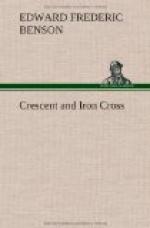On the heels of famine, like a hound behind a huntsman, came typhus. In the province of Aleppo before the summer of 1916, over 8000 persons had died of it. Doctors and medicines were unobtainable, for all were requisitioned for the needs of the army, and in Damascus and Tripoli, in Hama and Homs, the epidemic spread like a forest fire. No help was sent from Constantinople, none was permitted to be brought by the charitable from abroad, for famine and pestilence among the Arabs were working for the policy of Jemal the Great. There were no troops to spare who should hasten on the work, but the work was progressing by swift and ‘natural’ means. Hunger and pestilence—behold the finger of Allah the God of Love! How superior He showed Himself to the discarded Allah of the Arabs. ‘Ring down the curtain,’ said Jemal the Great, ’and let no news of the ways of Allah get abroad!’ So a strict surveillance was established on the coast, all boats were chained to the shore, and if any attempted to swim out to ships of the Allied nations which passed, the coast guards had orders to shoot him down. Too much news about Armenian massacres filtered through; there should not now be such leakage. And when starvation and pestilence had firmly established themselves, Jemal the Great went down to see what his personal exertions could effect. All was working in accordance with his plan; the poorer classes of Arabs were dying like flies, but mortality was not so successful among the wealthier, who could, to some extent, purchase food. So Jemal the Great set to work among them. He began by hanging the heads of Syrian-Arabs in Damascus, Beirut, and other cities. No semblance of trial, no prosecution or arraignment, were necessary: he established courts-martial under military control, made lists of the accused, and ordered the courts-martial to condemn them to death. Sometimes he made mistakes, appointing as the members of his court-martial men who were not such sturdy patriots as he, and refused to sentence for no crime the accused whom he nominated. He remedied such mistakes by appointing new boards of more seasoned stuff. Moslem and Christian alike were brought before them, and a general accusation of pro-French tendencies seems to have been sufficient to secure a sentence of death or lifelong imprisonment. He aimed not at the poor and the obscure, for whom hunger and pestilence were providing, but at the rich and the influential. The higher clergy in Christian circles, Bishops and Monsignors, were a favourite target, and among Moslems influential Sheikhs. Sometimes there was a parody of a trial; sometimes the parody was dispensed with, and when the black curtain was last raised over Syria, Jemal the Great had disposed of over eight hundred of the heads of the most influential of Syrian Arabs. He had got rid, in fact, of the whole House of Lords, and something more. Those who are acquainted with ‘feudal values’ among the Arabs will understand what




